Plants give us air, food, clothing, shelter, and medicine. Here are 7+ ways you can acknowledge their gifts and show your garden gratitude.
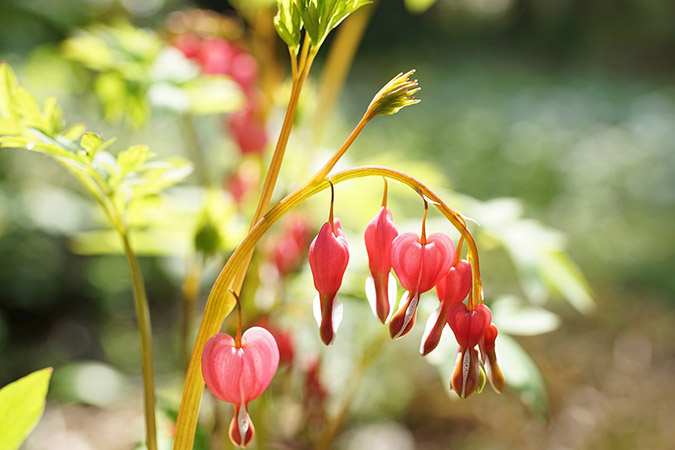
7+ Ways to Express Garden Gratitude
One of my favorite wild plants is the Farkleberry, or Sparkleberry. They are a native blueberry. If you cut out sugar from your diet…like I have…the berries can be really sweet! I always offer this plant what I call “Garden Gratitude” or “Plant Gratitude,” if you prefer.
(length: 3:30 minutes)
I know this might sound kind of woo-woo. When I leave offerings and give garden gratitude to the Farkleberry that I’m harvesting, I see more and more of them. It’s almost like they call to me.
You May Also Enjoy:
“How to Not Die While Wildcrafting: 15 Rules for Foraging Safely”
“Elderberry: Natural Remedy for Colds, the Flu, Inflammation … Even Cancer!”
We know that plants give us air, food, clothing, shelter, and medicine—but did you know that these living beings are able to communicate, too?
Think of a beautiful flower. The beauty is what calls to us. This is that plant’s particular way of communicating with us. If you want to take it one step further, ask it why it called you over.
The Basics of Garden Gratitude
We tend to walk through the world without acknowledging that plants, animals, the wind, etc, are living things. If you walk through your life with awareness, you’ll be surprised how often plants communicate with you, and how they respond to you. We can choose to deliberately engage.
What It Is: Giving gratitude to plants, the elements, and animals is based on the premise that everything is alive, and that we are all interconnected. It is a two-way street in which the plant and the person achieve mutual understanding, each communicating in their own language.
You May Also Enjoy:
“Acorns: The Best Wild Food for Beginning Foragers”
“Wild Mushroom Foraging: Identifying and Eating Foraged Plants”
Who Can Do It: Garden gratitude is natural and simple. Everyone can do it. It comes quickly and naturally once a person understands and practices it.
How to Get Started: There are three tricks to having garden gratitude for plants. The first is to believe it enough—even skeptically—to try it. The second is to actually speak to the plant. Third is to leave it an offering.
Ways to Give Offerings to Plants
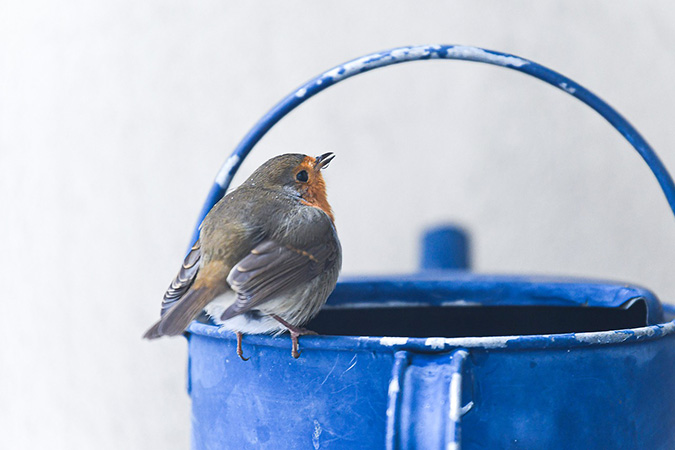
Offerings have been around for thousands of years. It is a practice that is found all over the world. However, modern-day society has forgotten the old ways.
Anytime I’m harvesting something I’ve planted, or even a wild one, I want to express my gratitude. My gratitude is for the plant producing the fruit and letting me pick and eat it, so I leave an offering.
You May Also Enjoy:
“Dandelions: 31+ Uses for the King of Weeds”
“7 Ways to Use Pine Trees for Food and Medicine, Year-round”
Plants also exchange carbon dioxide for oxygen, helping us breathe, too! Some plants give us medicine, shade us, and clothe us.
There are many reasons to give garden gratitude!
What Do You Have to Offer?
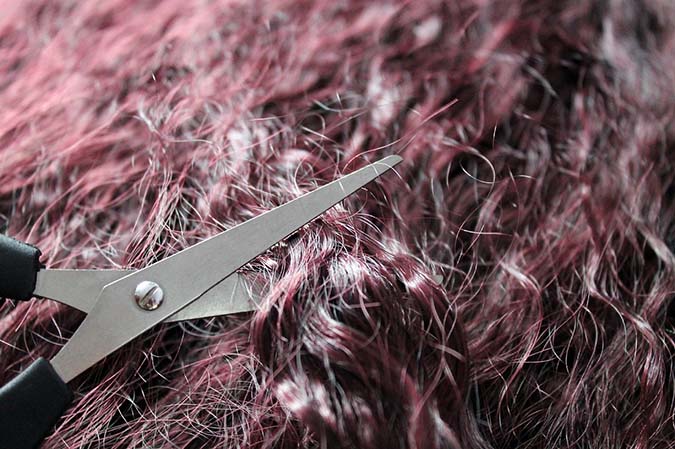
Anything can be used as a plant offering. I’m sure you’ll come up with a ton of them. Just make sure it comes from the heart.
Here are some offering ideas to get you started:
- Hair (great source of protein, which turns into nitrogen)
- Saliva (offers trace minerals and water)
- Song (research has shown that plants grow larger with certain types of music)
- Urinate beside them (it provides nitrogen for the soil)
- Water (plants need water, too)
- Tobacco (make sure it is additive and chemical-free, but is a source of decaying organic matter)
- Cornmeal (stimulates and feeds beneficial micro-organisms)
- Breathe on it (plants love carbon dioxide)
As you can see, there are some scientific reasons these offerings help the plant, too! Just making an offering of some sort is beneficial to your relationship with all wild plants.
Offerings do several things…
- It is an exchange of energy and a place of humility for you. We are all one and equal—You and the Plant.
- Offerings show you that we are all in the same world. All of us only get to be here for a short time, so be present and intentional with your time here.
It’s Not Magic!
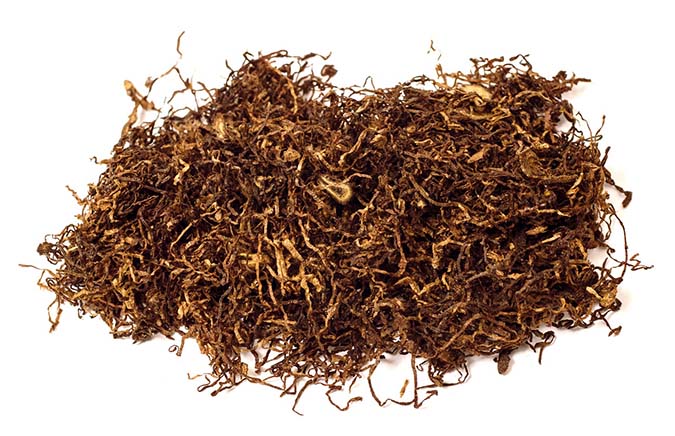
Every couple of years, I grow tobacco. Tobacco is a plant that has been used for centuries by the Native People of the Americas.
It is believed that Tobacco offers its own gift of interpretation, which helps us with disputes.
Just a pinch, spread on the winds…with words of thanks and garden gratitude. Your words to the plant can be as simple or elaborate as you’d like.
Want to know more about working with nature spirits to grow more food? Check out this article.
Learning From Your Plants
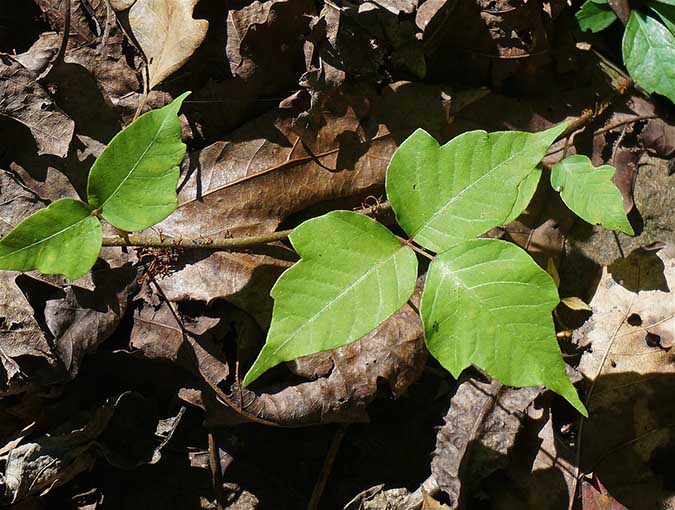
What to Expect: Sometimes, in the same way that ingesting a plant affects our body, communicating with a plant will affect our minds. You can also communicate and have garden gratitude for plants when you’re dealing with strong emotions or difficulties. Different plants offer help in different ways. Which plant in your garden calls to you? Why has it called to you right now? What are you dealing with in your life that perhaps the plant is trying to remedy?
You May Also Enjoy:
“Hackberries: Nature’s Grape-Nuts for Winter Survival”
“15 Wild Foods That Will Keep You Alive In An Emergency”
“Echolocation: My Secret Survival Skill”
“Sodium for Survival: 8 Ways to Find This Essential Nutrient in the Wilderness”
Why Some Plants Seem to Harm: Plants carry a level of energy that is very normal and safe for you to interact with. Even plants that can hurt you, don’t do it maliciously. In fact, once you accept that, you can work on understanding what else the plants are trying to communicate to you. For example, when people get a rash from poison ivy, often it is because there is an irritant or issue in that person’s life that they have chosen to ignore—something the plant is trying to get them to deal with. Once a person understands that, he or she can get a lot of help from that particular plant and others like it.
You can even give gratitude to animals domestic and wild. Here is a great article to get you started.
Be willing to communicate with your plants, animals, and the elements, means you say something and hear something in return.
Once you get over the doubt and skepticism, give it a try. Practice, and it will become second nature.
Being in relationship means being nurtured by the plant and you nurturing the plant. Who doesn’t want that!
What Do You Think?
So tell us! Do you talk to your plants? Do you leave offerings? Inquiring minds want to know, so leave a comment below!
________________________
This is an updated version of an article that was originally published on July 18, 2017.
The Grow Network is a participant in the Amazon Services LLC Associates Program, an affiliate program designed to provide a means for our team to earn fees for recommending our favorite products! We may earn a small commission, at no additional cost to you, should you purchase an item after clicking one of our links. Thanks for supporting TGN!

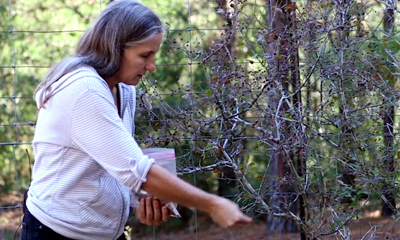
I do communicate with my plants daily. I have the most beautiful flowering hydrangea plant right now which I believe is rewarding me with its beauty for the care I have given it. This is my first year growing green peppers and okra. I have one pepper plant and one okra plant that were showing signs of stress and severely drooping from the hot afternoon sun. With extra water and shade from my patio umbrella they are looking healthy and my pepper plant is the first one to be growing a tiny little green pepper for me. I sometimes audibly talk to my plants but most of the time I talk to them from my thoughts and actions.
Great article… love it. I have practiced plant gratitude and communication for some time now with wonderful results. In our community garden I am often asked why does my plot do so well, even when I am traveling and not caring for it…. well I tell the plants I am leaving for a while, tell them that watering might be sporadic and encourage them to soak up any rainfall that comes their way…. often when I get back my plot looks as good or better than some that have an attendant gardener…. part of it could be that I have been building up the soil with used horse and rabbit bedding and sea weed for some years now but I still think the plants apprecite knowing my plans…I also notifiy plants that have to be transplanted a few days in advance that there will be a move in their future. This gives them a chance to be ready for it and I believe transplanting is more successful because they get some notice…. perhaps they withdraw some energy from root tips, I don’t know. I do notice that transplanting is more successful with this practice. What can I say… it works and it is only right to offer appreciation to those living entities that give of themselves to nuture us….
I talk with my plants all the time. I tell them how beautifully they are growing, thank them when I harvest their fruit or leaves, encourage them when they are struggling. And when I dig the dandelion roots to make tea, I thank them for growing there and explain why I’m digging them. I also thank plants that I am removing for whatever reason – thank them for growing and for the purpose they served and explain why I am removing them from my yard. And if possible, I replant them elsewhere or give them to another gardener. If not, they go into my compost and I tell them thank you for continuing to add value to my garden.
I also express gratitude to all the various insects and what they communicate and contribute. I am so grateful for the entirety of the natural world.
Hi Marjory!
I enjoyed this segment. I had a thought. What about people who have septic tanks – could they grow a vegetable garden? A friend has an acre of land in which his home and septic tank are and it floods some springs. Would this be a good place to grow plants?
Thanks!!
I do believe that the plants and animals communicate. I do talk to my little chicks in the egg as they grow & the babies as they unzip from the shell. They peep to me. As you walk through the bush, the trees give off a certain calming chemical & also a scent that soothes the soul.
Through their unique attributes and complexities, they are telling us of their Creator, God. I offer God my deepest thanks for His wonderful creation & provision of these plants and animals. He has placed them here to praise Him & point to Him, and to care for you & I, who in turn should care for them (what you might consider an offering to them).
They are said to praise their Creator: Psalm 148:1-3; tell of their Creator: Romans 1:20; creation awaits eagerly, subjected not willingly…it groans: Romans 8. Psalm 98 says that “the trees of the fields will shout for joy;” Isaiah 55 says “The mountains and the hills will break forth into shouts of joy before you, And all the trees of the field will clap their hands”. What a wonderful and beautiful picture of life!
I read recently that the First Nations People revered the cottonwood tree as it would shake even when there was no wind. They are one of my favorite trees, so majestic & beautiful! I have yet to watch for this, but am eager to witness it one day!
I forgot to add that one day, while having a very bad day, I lay in the hammock far from any flowers. I had a little hummingbird come up not once, but twice to my face, to help encourage me to keep on living. It made some twitters at me, I softly answered back…both times…and it replied before moving on. It was so beautiful and touched me so deeply that I cried.
Thank you for reminding me of that day!
I love this article – thank you for sharing! I have been talking to plants for a few decades, but I have never actually left an offering. While I don’t think it is necessary if one communicates genuinely from the heart, I like the idea of also showing appreciation in an outward way. I love the idea of breathing on it – so intimate, yet beneficial for the plant!
I so appreciate you sharing your thoughts that are outside the tiny box of the road heavily trodden! All beings can communicate with one another… one just has to try!
Hello Marjorie….I so enjoy hearing the spiritual aspect of your gardening/homesteading. To work with your hands and heart in nature, effecting living things, exchanging energy and having appreciation is all part of our symbiotic relationship. I, too, speak, sing, play music, deliberately direct positive energy with appreciation as well as hold my hand over an ailing plant and ask God for healing energy for the plant.
I give prayers of gratitude to our Heavenly Father for the beautiful plants in my garden. Last summer I learned to pray that bees would come to do their magic, so that my garden would produce well. It worked! I am grateful for the peace I find in simple tasks as watering and weeding. I had not thought to give a gift – but now I recall something an Apache Potter taught my family many years ago. As he dug clay out of the earth, he sprinkled corn over the area and said “Tsi ga Tsi go” (sp??) which means “I give to you, you give to me”. How simple and how lovely. Thanks for reminding me that we are all part of this Earth.
Marjory, Thank you for this article. I have been a gardener for nearly 30 years. I started with a very small garden, on an in town lot with tons of perennials and a few annuals. I knew absolutely nothing!A friend loaded my car up and handed me a few books and off I went on a long adventure. Six years ago I moved to a much larger piece of land and a much larger garden plot, larger actually than the whole in town lot! I have been obsessed from day one over weeds!!! How to have a beautiful garden without the weeds. This grew to a true struggle with gardening here as the weeds were much larger and stronger, too strong for me to wrestle them any longer. A true hatred for the once loved gardening had seductively grown in me. This year I determined to garden with a new vibration, love. I have approached all my gardening with a softer, gentler, approach. I was doing good until the weeds over took my space, again. They gained total control while I recovered from an overused( pulling weeds) shoulder. Instead of expressing or even allowing the aggravation to grow in me, and between me and my garden I have just let it be. I will just have to harvest around the weeds. I have had enough, this will be my last year of gardening on this scale. I am in my 60’s now and I am listening to my body beg with mercy to do something besides pull weeds. I am glad that I am able to start the process of letting go with gratitude and gentleness. And the beans are begging me to come down and reseed them!!!
check out sites for easy weed control and rebuild soil lay out card board where you want no weeds https://www.bing.com/search?q=Lasagna+gardening&input=2&nclid=855B6D67CB18AE3EEC560F2814BC859C&FORM=WNSBOX&cc=US&setlang=en-US&sbts=-1 and https://www.youtube.com/watch?v=6rPPUmStKQ4&t=1334s
I talk to my plants and animals all the time. I actually thought it was weird that people didn’t. Glad I found you. Blessed by the interaction and the knowledge. Thank you
I wanted to add, it was at a time when I was learning deeper spiritual principles for my life. I was drawn to plant a garden. While working the ground for my first garden, I realized that Spirit was also breaking up the hard thorny, stony ground that had been built up around my heart. As a result, I have developed a special kinship with the plants and animals that are in my life and see them as gifts. It goes without saying that any gift should be treated with reverence and gratitude. I think it is a beautiful thing to see more and more people opening up to the energy so freely given from Spirit. Dancing and singing in the garden is also a great offering. My dogs of course think I am nut’s, but that ok, I let them howl too when the mood strikes them.
This is one of the greatest ways we as humans can become more connected and not so insular and closed. Food is lovely… Thanks for letting me ramble.
Shirley, I can relate, pulling weeds is a grueling task. I too am getting up there in age. I find that weeds are like disquieting thoughts, if I don’t pull them I become inundated- Thankfully, grandchildren have lots of energy. If you have any, put them to work. Great life lessons… I think you are awesome. I love the way your garden brought you love and peace, even in the midst of weeds.
I’ve recently started speaking to my garden plants, I’ll greet them with a “hello” and tell them they are looking good today. It seems to help both of us.
What I know about talking to plants is that they get attuned to your energy and if you are suffering or anything is happening for you, they will provide fruits etc, that heal you. In other words they are here for us and work for us. Thank you for this article. We need more of these kind of things.